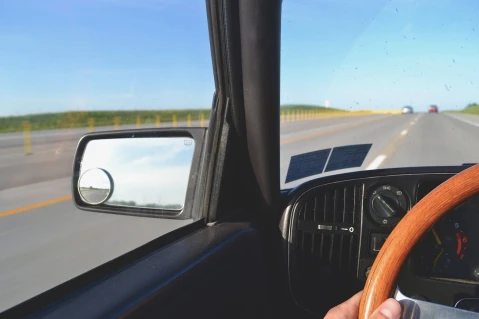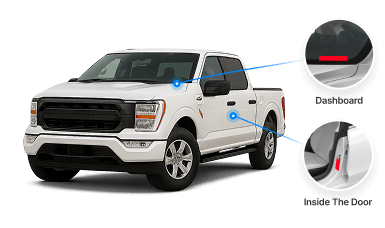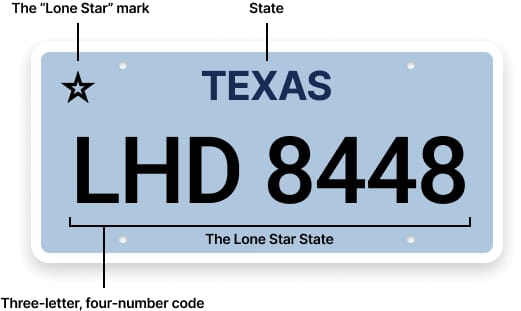
How to Find a Window Sticker by VIN
Discover how to find your car's original window sticker using its VIN and acce...
You can check any Texas license plate online and get vehicle information about it
Looking for the VIN?
Here is there you’ll find it:

Buying a used car is a significant financial decision, so learning as much about a vehicle as possible before buying it pays off. While you can learn a lot by VIN lookup, this number isn’t always available. However, using our Texas license plate search, you can find all the same factory information about a vehicle, including the model year and equipment. This helps you weed out questionable sales listings. You can order a full vehicle report from there, helping you identify problems like odometer rollbacks, title issues, and more.
Texas divides its private plates into four main categories: passenger vehicles, motorcycles, trailers, and private buses. All standard and custom plate designs are offered for all plate sizes. Since 2009, these plates have all used seven digits. The current design, dubbed the “Texas Classic”, was first issued in 2012. It has black lettering over a white background. Texas is also experimenting with digital plates, but these are only available for large fleets of commercial vehicles.
Texas vanity plates are more common than you might think. The most popular of these plates is a white-on-black design, reminiscent of plates issued by the Lone Star State from the 1940s to the 1960s. If you didn’t know about the plate’s history, you could easily mistake these for standard issue plates.
Texas offers passenger vehicles, motorcycles, trailers, and private bus plates to private owners. Texas (TX) vanity and standard license plate designs are offered for all four types of vehicles. 2009 and later plate numbers use seven digits, even if they’re on a motorcycle. Texas is one of the few states to use digital plates, but these are only offered to large commercial fleets. All motor vehicles must have front and back plates.
Standard plates are white with black lettering. There are two types of vanity plates: My Plates Select and State Sponsored plates. Both types of plates are available through the MyPlates website. My Plates Select plates are handled by a state-approved vendor, while the TxDMV handles state Sponsored plates.
Texas personalized plates are available in all designs, including standard plates. Some license numbers are auctioned off by MyPlates. These numbers include popular words and phrases. The state pitches its plate number auctions as an investment: if you win a desirable plate number, you can hold onto it and sell it to someone else.
People with a permanent disability can get a disability parking plate by filling out an Application for Persons with Disabilities Parking Placard and/or License Plate form (VTR-214).
General issue car tags are the most common type of license plates issued in Texas. The current “Texas Classic” design uses seven digits and has two high-visibility security threads that make it easy to identify genuine plates. These plates can be personalized with different color backgrounds.
Like many states, Texas has specialty plates with a wide range of designs, including the classic black Texas license plate. Military registration plates are only issued to those who can prove they served in the organization on the plate.

The county tax office handles titling and registration for most vehicles. You can register your vehicle in person, by mail, or through an account on the state’s “Texas by Texas” app. Some counties also have substations and subcontractors that handle registration. If you move to Texas, you must register your vehicles within 30 days. If you buy a vehicle, you also must register it within 30 days. Plates can be transferred between vehicles in the same class.
Registration and licensing requirements vary depending on the type of vehicle:
Texas DMV vehicle registration stickers have the same number as the license plate to reduce fraud. While the plates might be removed or covered on vehicles put up for sale, the registration sticker is usually left alone. That means you can use this number with our Texas license lookup.
Plates are issued at your local county tax office. To get a plate, you need your current license plate number (if applicable) the VIN, proof of insurance on the vehicle, and proof of a current vehicle inspection. All counties require a safety inspection, while all but 17 of the state’s 254 counties require an emissions test. Safety inspections are valid for two years on new vehicles and one year on all other vehicles.
Do you want that black license plate Texas drivers love so much? Wondering how to get license plates in Texas that support charities or show your alma mater? In 2019, the Texas DMV handed over the issuing of My Plates Select and State Sponsored plates to the MyPlates site. Once you place your order, My Plates Select plates are handled by a state-certified vendor, while state Sponsored plates are handled directly by the TxDMV. You can get a randomly generated license plate number on your choice of background, a custom number on a standard plate, or a custom plate and number.
Transferring TX plates is free, and plates can be transferred between vehicles in the same category. Transferring is handled by your local tax assessor-collector’s office. Plates can be transferred between vehicles or between people.
If you’re transferring your plates to another vehicle, be sure to remove the registration sticker from your old vehicle. These stickers include your license plate number.
While there are only four personal plate categories based on size, Texas has multiple commercial license plate categories covering everything from semis to backhoes. Licenses are required for all vehicles driven on the highway except farm equipment.
Semis and trailers are issued plates together. A semi that weighs 10,000 lbs. or more is issued a combination plate, while a trailer over 6,000 lbs. is issued a Token Trailer plate. Registration costs vary depending on the combined weight of the truck and trailer. Vehicles used to harvest, or transport lumber are required to register for a Forestry plate. Any construction equipment that has a driver must have a Machinery plate.
When a vehicle is registered in Texas, that vehicle’s information becomes part of the public record. This includes several forms of identifying information, including the vehicle’s model and VIN. Our license plate search uses this information to find official records, creating a page that lists the vehicle’s registration information. When you order a report, our search engine uses this information as a starting point, building a full vehicle history.
Using our Texas VIN check saves you time and effort when you’re shopping for a new vehicle. Our site decodes the VIN, listing out factory information, including the make, model, year, manufacturing location, equipment, and more. This is helpful for verifying the accuracy of sales listings, especially if you’re looking for a low-production model. Don’t have the VIN? If you use our license plate search, you’ll get the same information as a VIN check and the VIN for the vehicle registered to the plate.
Once you’ve narrowed your choices, order a full VIN or license plate lookup. you’ll get a report that details the history of the vehicle. This includes sales records, title brands, insurance claims, theft reports, and other police records. Our vehicle title search covers all states, not just Texas. This lets you know if the vehicle had legal issues in another state, including title brands and unpaid liens.
No. Due to the way the DPPA and related laws are worded, this falls under restricted personal information. Why? You are only allowed to view the vehicle history. If you used our VIN lookup to check a vehicle for sale and got a previous license plate number, you could look up other vehicles registered to that plate. When you use our DMV VIN check, you won’t get the current license number. However, you can do the reverse: if you have the plate number, you can get the VIN for the vehicle currently registered to that plate. Our search engine uses the Texas (TX) plate number as a starting point for finding information about the vehicle.
Our Texas license plate lookup searches public databases for information tied to the license number. This includes the vehicle’s VIN and its specifications. When you order a full vehicle history report, you’re also get the official history of the vehicle. This includes accident reports, insurance claims, theft reports, and outstanding liens. Here’s just some of the information you’ll get from one of these reports:
By spending a few dollars now, you can avoid buying a vehicle that has hidden damage, or might be repossessed due to legal issues.
People and organizations exempt from DPPA regulations include auto manufacturers, government agencies, towing companies, and anyone with written permission to access records. These exemptions are used to notify you of vehicle recalls and impounded vehicles and verify personal information for driving-related jobs.
The Driver Privacy Protection Act (DPPA) is a national law limiting vehicle records' access to information. Texas law includes the limits of the DPPA in the Motor Vehicle Records Disclosure Act and the Public Information Act (Section 552.130). Under these laws, you can learn the owner’s first and last name when you use our vehicle owner lookup. However, you cannot access other identifying information, including their address, license number, social security number, or disability status. Any additional information in government records is available to the public under the Freedom of Information Act (FOIA).
DPPA restrictions are waived under certain circumstances. This includes official government business and notifications for manufacturer recalls and vehicle impounding. You can find instructions for filing a request for this information at the link below the historical title information section of our vehicle reports.
While the TxDMV handles vehicle registration, in-person business is conducted at county tax assessor-collector offices, while the Texas Department of Safety manages vehicle inspections. Find your local county tax office here and local inspection stations here.
To register a vehicle, you need to get it inspected and insured. Texas requires $30,000 of injury coverage per person and $60,000 total coverage, plus $25,000 for property damage. Once you license your vehicle, you can renew your tags online using Texas by Texas (TxT) app or website.
Still have questions about licensing a vehicle in Texas? You can learn more at these websites:
Yes, looking up Texas plates is free. However, to view all information you will need to buy a full vehicle report.
All you need is the license plate number. When you perform a search, you’ll also need to specify the state the plate is from.
In some cases, you may need legal authorization or written consent from the owner to comply with the Driver’s Privacy Protection Act (DPPA). Our search conforms to all applicable laws, so you will only be shown information that you are legally allowed to access.
Visit our website and click the link to the License Plate Lookup page. Enter the plate number and the state that issued the plate. Click the “check plate” button, and our site will give you information about the vehicle, including the model and year. From there, you can order a full vehicle report.
All the information from our site comes from official sources, so you can trust that it will be accurate
Yes. Texas plate lookup checks public databases, which store the plate number with other identifying information, like the VIN. Our site references these records to build a complete vehicle history.
Discover expert tips, news and advice on buying and maintaining used vehicles

Discover how to find your car's original window sticker using its VIN and acce...

New EpicVIN report design represents a significant departure from the previous...

Discover how understanding the difference between a car's make and model can g...